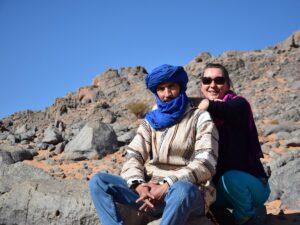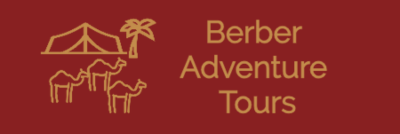Is it dangerous to travel to the desert in Morocco?
This is probably the most frequently asked question about travelling to Morocco. Personally, I would say it depends!
For example, you shouldn’t drive/walk alone in the desert. At least not the first few times. If you have a good off-road car, you can drive into the desert alone with a bit of experience. For everyone else, it’s not a good idea.
There are tarmac roads in relatively good condition as far as M’Hamid and Merzouga. You can also drive there in a small hire car. However, how safe the roads are always depends on other factors. I find that many Moroccans are not good drivers, they drive too fast, come to close and don’t know how to use indicators. You also occasionally see camels on the road, which can be dangerous, especially at night, as you can’t see them until it’s too late. Cyclists and motorcyclists are also usually travelling without lights.
How safe is it for women travelling around the world? I certainly feel much safer here in Merzouga than in any major European city. Women are respected and valued in Morocco (as in almost every other Muslim country too). The Amazigh (Berbers) in the desert are generally very helpful and always friendly. Of course, you should also behave respectfully yourself, wear long clothes and don’t provoke people.
For our desert hiking trips, you can always request Eva to come along, if you feel safer that way. And you can also book Eva as your travel companion for round trips around Morocco.
The only ‘danger’ for women travelling alone are probably the guides who try to entangle them in a ‘love scam’. You really have to be careful, some of them have endless patience and are extremely good actors. But they are not dangerous in the true sense of the word. Of course, this doesn’t just apply to the guides in the desert, but also to drivers, city guides and everyone else. So, don’t flirt (and don’t smile too much, which is often equated with flirting here) and don’t allow any physical contact. Set clear boundaries.
You can read more about the ‘red flags’ of Moroccan men here in this article.
Otherwise, you can of course trust the guides! They know their way around, are very responsible and will make sure that nobody gets lost.
The camps now almost all consist of white plastic tents with doors and locks. So you can lock up your valuables, and even yourself at night. I don’t think that’s necessary, but you never know. In Merzouga, I leave my laptop on the table in the café when I go to the toilet. If it is ever stolen, it will certainly not be by a local, but by a tourist. A taxi driver once chased after me when my mobile phone fell out of my pocket in his taxi. I don’t think this would happen at home…
It is in the larger cities, where it is chlorinated. I only drink it filtered or buy bottles. But I’ve met a few tourists who have had tap water everywhere without any problems.
Extreme weather is generally a realistic danger in the desert. Sandstorms in particular, are a seasonal occurrence and can mean that you can no longer find your way (back). This is why it is so important not to go into the desert without an experienced guide. You can’t really predict the sandstorms either. They usually come as a surprise; if you are lucky, you can see them appear on the horizon 20-30 minutes in advance. Sometimes they are over within 1-2 hours, sometimes they last several days. If the wind is very strong, we all sleep in the big tent, as the small Igloo tents don’t necessarily survive.
Floods like the one we had in September 2024, on the other hand, are very rare and also rather predictable. There is usually at least a few days’ warning, but this is only of limited help on a longer hike without internet reception. If it looks like it’s going to rain, we always choose our campsites very carefully, higher up, not in a river bed.
Yes, there are. Snakes and scorpions are particularly dangerous. However, you can count yourself very lucky if you get to see them. In almost 6 years in Morocco, I have only seen 3 snakes and 3 or 4 scorpions (apart from the ones that my cats leave dead in the kitchen). And usually you don’t even have time to pull out your camera before they’ve already disappeared.
Both snakes and scorpions are more active in summer, when a visit to the desert is not really advisable anyway.
To minimise the risk, you should always wear shoes (at least flip-flops), as both like to hide in the upper layers of sand. And empty out your shoes in the morning in case a scorpion does find its way there.
That depends very much on what has happened and where. From Merzouga, the nearest major hospital is in Errachidia, 2 hours away by car. There are no rescue helicopters here (only for major rallies or the Marathon des Sables). If you break something here while riding a quad bike or motorbike, the journey is quite long. And more complex operations (e.g. for spinal injuries) are only carried out in the big cities, e.g. Marrakesh and Casablanca. This means up to 10 hours in an ‘ambulance’. These usually simply have a stretcher in the back of the vehicle, but do not provide any medical care en route. In this respect, you should think carefully about whether you really want to pursue a high-risk sport so far off the beaten track.
On hiking tours, the biggest emergency is probably sunstroke or heatstroke. That’s why we don’t organise tours in summer. We also insist on you carrying relatively large amounts of water in your day pack and wearing a turban or other sun protection on your head. Breaks are taken under acacia trees wherever possible. This helps to minimise the risk considerably.
And if you sprain your ankle on the way? Then you can either continue the tour on camelback (if the route allows) or we can call a car as soon as possible for transport to the next town. However, you will have to bear the costs of this yourself, so please make sure you take out good international health insurance, then you will be reimbursed!
Like all larger animals, camels can of course, be dangerous. But they would have to feel provoked to do so. During the rutting season (approx. Nov-Feb), the camel bulls like to try and fight with each other. Under no circumstances should you go between them or even stand near them when that happens. They also don’t like to be touched during this time and can sometimes snap at your hand.
And of course, you can theoretically fall off a camel when you’re riding. But that’s very unlikely if you hold on to the handle and pay attention.
Well, who knows for sure. The German Foreign Office warns against travelling to the desert off the beaten track, but I feel totally safe there too. There have been fewer terrorist attacks in Morocco in the last 15 years than in Europe. And there are no kidnappings here either, like in Mali, for example. In this respect, I think the risk is the same or lower than in Europe and nobody worries about it there.

Hassan and Eva offer hikes in the desert and the mounaints as well as roundtrips through Morocco with Berber Adventure Tours.
WhatsApp us
